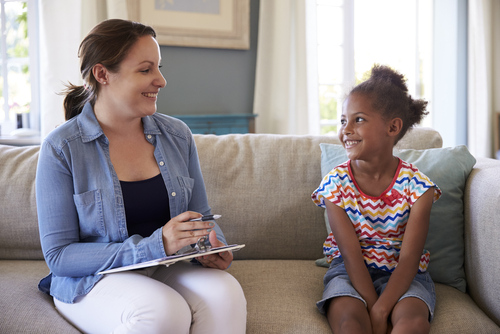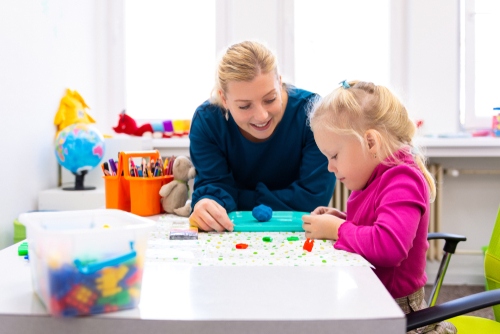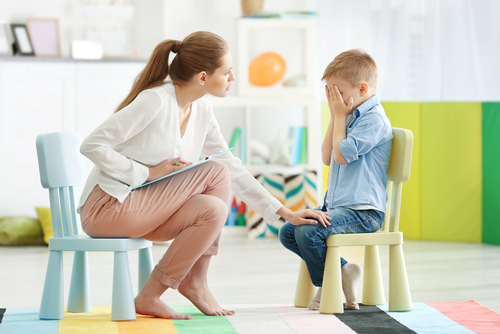It can be challenging to convince a child that it is all right to trust you and tell you their most intimate secrets. It’s difficult, but not impossible, and if you read the following books on this issue, you should have a better idea of how you will be able to communicate with your child clients.
Why These Particular Books?
There are truly many qualities that make any one book a top choice in any line of subject matter. Qualities like readabilty and format, relateability, author credentials, thoroughness of subject matter coverage, award accolades, and many others can all make or break the true value of a book of any kind. In our preparation of our top-10 lists such as this one, we strive to find a blend of all of these types of qualities that comes together in the most complete way. With this said, we hope you find the following 10 child psychologist books to be as highly deserving of being on the top-10 list as we do.
Damaged: The Heartbreaking True Story of a Forgotten Child by Cathy Glass
Damaged: The Heartbreaking True Story of a Forgotten Child is a story that every child psychologist should read. It is about a child named Jodie who suffered unspeakable abuse at the hands of her parents who ran a pedophile ring with their neighbors. The story highlights the fact that Social Services failed to address the pedophile issue. Jodie was placed in a residential unit before she ended up with Cathy Glass who has worked wonders with her. Although Ms. Glass had improved Jodie’s life immensely, Social Services placed the girl in a residential unit again. Ms. Glass remains a part of Jodie’s life and continues to help her to this day.
The Psychology of the Child by Jean Piaget and Barbel Inhelder
Child psychologist Jean Piaget wrote extensively on the subject of child development. This particular book was written after 40 years of research and study in the area of child development and discusses the stages of childhood at length. For example, Piaget has studied children from infancy to their middle years. He also includes a section that is devoted to adolescence. Specifically, he details the child’s cognitive development during these periods along with his collaborator Barbel Inhelder. Piaget’s work has influenced countless others over the years.
How to Talk so Kids Will Listen & Listen so Kids Will Talk
This book by Adele Faber and Elaine Mazlish would be invaluable to someone who plans to become a child psychologist. The authors are known as experts in this area, and they explain how to address a child’s negative emotions as they offer constructive ways that those negative feelings can be expressed. The authors also describe the difference between praise that is helpful and praise that can be harmful. Readers of this book learn how to set limits for children without creating a hostile atmosphere. It even addresses the issue of behavior correction with the intent of helping children become self-disciplined individuals.
The Demise of Guys: Why Boys Are Struggling and What We Can Do About It
Philip Zimbardo and Nikita D. Coulombe introduce the idea of “arousal addiction” to the public with this book. They express the idea that boys are addicted to video games and pornography, and they suggest ways that young men can be encouraged to live differently. They explain that young men are having difficulties being in successful relationships and excelling in school and in their jobs, and they introduce a plan that can help young men become what the world needs them to be. They enlist the help of both parents and teachers in these exercises.
Natureshock: New Thinking about Children
Po Bronson and Ashley Merryman ask many questions about childhood that they do not believe have been answered by psychologists of the past. They have performed extensive research on this subject and believe that parents have been doing the wrong things. For example, the authors do not believe that people are praising their children correctly. According to them, instead of praising the child, it is better to praise the outcome of the action. The authors have many suggestions for those who work with children in this book.
Building Emotional Intelligence: Practices to Cultivate Inner Resilience in Children by Linda Lantieri and Daniel Goleman
Emotional intelligence is one of the most important ingredients to being a successful, resilient, and overall well-versed person, and when kids learn how to truly take on this trait, they are very well set for the future. This excellent selection among all the child psychologist books out there really explains what it takes to help foster emotional intelligence in young minds of all kinds. Aside from being a great read all unto itself, Building Emotional Intelligence: Practices to Cultivate Inner Resilience in Children has a special edition, which can be found at select retailers, that comes with an audio disk and practical guidebook.
The Whole-Brain Child: 12 Revolutionary Strategies to Nurture Your Child’s Developing Mind
Daniel J Siegel
Daniel J Siegel is a Harvard Medical School scholar, well-regarded doctor, and author of numerous child psychologist books. In Siegel’s New York Times Bestseller, The Whole-Brain Child: 12 Revolutionary Strategies to Nurture Your Child’s Developing Mind, readers are taken on a deep dive into how child psychology works and how different parts of the developing brain function as a determiner of that very psychology. How do the left and right sides determine behaviors and reactions? Why do certain activities overwhelm or underwhelm the developing brain? The answers to questions like these and many more can be found in this great child psychology read.
How to Talk so Little Kids Will Listen: A Survival Guide to Life with Children Ages 2-7 by Joanna Faber
Joanna Faber, the author of How to Talk so Little Kids Will Listen: A Survival Guide to Life with Children Ages 2-7, is a lifelong expert in early childhood education, special education, and early development and is also the daughter of world-renowned author and educator Adele Faber. In this great child psychology book of Fabers, the reader is essentially given a full lesson on how to connect with children in a way that promotes trust, openness, and open communication. Find out why experts often refer to this book as “The Parenting Bible.”
Therapy Games for Teens: 150 Activities to Improve Self-Esteem, Communication, and Coping Skills by Kevin Gruzewski
Therapy Games for Teens: 150 Activities to Improve Self-Esteem, Communication, and Coping Skills is another top-rated child psychology book. Rather than focusing on young children, however, this book focuses on teens, and more specifically, therapeutic activities for teens. Not only do these activities help with stress, anxiety, social issues, and more, but they also help to ultimately promote a higher level of self esteem. The book’s author, Kevin Gruzewski, is himself a therapy expert of more than two decades of practice.
No Bad Kids: Toddler Discipline Without Shame by Janet Lansbury
Toddler discipline is often a very unique, challenging, and uncertain part of the child parenting cycle. However, with some extra insight into how toddlers brains work, this part of the parenting job can really be made more manageable and rewarding. No Bad Kids: Toddler Discipline Without Shame is a collection of author Janet Lansbury’s written work that certainly makes for a complete guide into the subject. Readers can find a myriad of helpful guidance on topics including temper tantrums, limit-testing, cooperation, boundaries, discipline, and more. Janet Lansbury herself is a tenured expert and educator in the child psychology field.
Additional Child Psychology Publications
In addition to some of the top child psychology books out there, there are numerous ongoing publications that provide great subject matter on the topic. The following represent some of those top sources for ongoing child psychology publication material.
Featured Programs
Journal of Child Psychology & Psychiatry
The Journal of Child Psychology & Psychiatry, or JCPP as it’s commonly referred to, is an ongoing publication on child psychiatry and psychology by The Association for Child and Adolescent Mental Health. The ACAMH is a mental health advocacy organization that has been a big presence on the scene for over 60 years. This journal by the association offers a vast expanse of up-to-date peer-reviewed articles, clinical trial data, and more and is updated on a quarterly basis. Whether you are a parent trying to understand up-to-date facts and findings or a doctor looking for current theories or trials, this journal is a very valuable wealth of knowledge.
Journal of Child and Adolescent Behavior
The Journal of Child and Adolescent Behavior is an ongoing product courtesy of Omics Online, a reputed conference-organizing and open-access publishing organization. This particular journal covers a wide range of subject matter such as child psychology, developmental concepts, child health impairments and their effects, genetic factors, neurobiology, learning and memory, and more. These works are all collected from experts such as Shuo Wang, Josephine Etowa, Beth Haney, and Tahir Saeed and are then published on the journal website for anyone interested.
The Journal of Clinical Child and Adolescent Psychology
The Journal of Clinical Child and Adolescent Psychology, or JCCAP, is an ongoing offering of the Society of Clinical Child and Adolescent Psychology. The Society of Clinical Child and Adolescent Psychology itself is also a distinct division of the American Psychological Association or APA. This journal strictly focuses on several areas of subject matter. These areas, according to the organization, include the development and evaluation of assessment and intervention techniques, the development and maintenance of clinical child and adolescent problems, cross-cultural and socio-demographic issues that have a clear bearing on clinical child and adolescent psychology, and training and professional practice in clinical child and adolescent psychology.
Additional Organizations of Interest
Finally, there are also a number of excellent organizational resources with which many more resources and informational pieces can be found on child psychology. These are some of those organizations that are the most reputed in this realm of expertise and advocacy.
American Psychological Association
Founded in 1892, the American Psychological Association, or APA as it’s known, has come to be a foremost authority on all areas of human psychology. To that end, the APA is responsible for some of the most influential advances in modern psychological understanding and is a provider of numerous certifications required for working in the psychology field. Also as a result of its profound influence on the greater psychological field, the APA offers a very rich set of informational resources. These include publication and research databases, psychology news and events info, and education and career resources, as well as an additional layer of benefits given to those who are APA members.
American Academy of Child and Adolescent Psychiatry
The American Academy of Child and Adolescent Psychiatry, or AACAP for short, represents another great organizational resource for those wanting to learn about psychiatry and psychology in teens and young children. AACAP offers a membership option but also offers many resources without any such membership requirements. Events and meetings are one significant offering of the organization, while ongoing news publication, career and educational resources, and advocacy resources can also be found and utilized by anyone. In addition, AACAP offers a number of great assessment tools for public use such as the Early Childhood Service Intensity Instrument and the Child and Adolescent Level of Care/Service Intensity Utilization System.
MentalHealth.Gov
MentalHealth.Gov is yet another fantastic resource for child psychology-related information as well as psychology info for all other ages and roles. Organized into an easily-surfed interface, this government website makes it simple to find information in all of these areas. On the child psychology side of things specifically, the website offers guides and informational pages for parents, caretakers, educators, and even children and teens themselves. Once the visitor has chosen their role or subject, they can then find plenty of helpful info and links to further help of relevance.
American Board of Professional Psychology
Finally, the American Board of Professional Psychology is just one more excellent resource in all areas of human psychology to be aware of. Highly authoritative and respected, this organization is at the leading edge of the psychology science and its practice. For those seeking child psychology information, the organization offers a variety of resources. While membership has its additional perks, anyone can inquire with the ABPP on educational topics, career topics, and up-to-date findings in the world of human psychology.
These ten books and other resources will help you develop a strategy for tackling the issues that your child clients will bring to you. Working with children can be especially rewarding, so read one book, or read them all. The outcome is sure to be positive after you have done so.
Related Resources:




